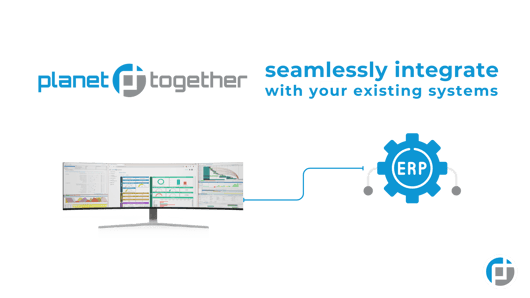
Building Resilience: Navigating the New Normal of Tariffs in Medical Manufacturing Supply Chains
The New Normal of Tariff Volatility
In the post-pandemic global economy, tariffs are no longer occasional regulatory spikes—they are a persistent and disruptive force. For Supply Chain Managers in medical manufacturing, this new normal poses a serious threat to cost efficiency, delivery timelines, supplier relationships, and overall operational stability. Whether it’s ongoing U.S.-China trade tensions, new EU medical device regulations, or retaliatory export duties on critical components, tariff volatility now demands proactive planning—not reactive response.
What’s needed is a resilient, intelligent supply chain—one that can absorb shocks, reconfigure sourcing strategies in real-time, and maintain service levels under pressure. This is where Advanced Planning and Scheduling (APS) solutions like PlanetTogether, especially when integrated with ERP systems such as SAP, Oracle, Microsoft, Kinaxis, or Aveva, become not just useful, but essential.
Understanding the Tariff Challenge in Medical Manufacturing
The medical manufacturing industry is particularly vulnerable to tariffs for several reasons:
Highly regulated inputs: Many components—such as sterile packaging, diagnostic reagents, or electronic control units—are sourced globally under strict regulatory standards.
Tightly bound supplier contracts: Long-term sourcing agreements make it difficult to pivot quickly when tariffs spike.
Global demand for specialized devices: Tariffs on one production node can have ripple effects worldwide.
Low elasticity of demand: Patient care timelines cannot afford delays caused by cost adjustments or supplier disruptions.
When tariffs are imposed or adjusted suddenly, the financial and operational repercussions across your multi-tier supply network can be swift and severe.
Rethinking Resilience: Beyond Buffer Stock
Traditional risk mitigation tactics like buffer inventories or multi-sourcing are no longer sufficient on their own. They often introduce new inefficiencies, from overstocked warehouses to conflicting lead times. To address tariff volatility strategically, Supply Chain Managers must rely on real-time data visibility, dynamic modeling, and agile execution tools.
This is where integrated APS systems like PlanetTogether, especially when synced with ERP platforms such as SAP, Oracle, Microsoft Dynamics 365, Kinaxis RapidResponse, or Aveva, offer a comprehensive solution.

How APS Integration Supports Tariff-Resilient Planning
Let’s examine how PlanetTogether APS, integrated with your ERP system, helps manage tariff disruption across key supply chain touchpoints:
Tariff Impact Simulation
PlanetTogether’s scenario planning capabilities allow you to:
Model the impact of new or potential tariffs on materials, transport, and vendor costs.
Analyze how tariff changes affect customer pricing, margins, and order viability.
Run simulations comparing alternate sourcing strategies or manufacturing sites.
Integration Benefit: Pull real-time cost data and historical tariff impact from SAP or Oracle, enabling rapid scenario modeling without siloed spreadsheets.
Supplier Optimization and Tier Switching
Tariffs can instantly make some suppliers unviable. APS tools help identify:
Lower-cost tier-two suppliers not affected by current tariffs.
Regional suppliers with faster delivery timelines and lower geopolitical risk.
Co-manufacturing or contract options in non-tariffed regions.
Integration Benefit: ERP systems like Kinaxis offer supplier network visibility, while PlanetTogether synchronizes it into your active production schedule.
Dynamic Rescheduling
When a new tariff causes a delivery delay, a change in lead time, or a cost hike, PlanetTogether helps:
Re-prioritize orders to match capacity and cost constraints.
Re-sequence operations without breaking compliance or quality guidelines.
Align downstream logistics with upstream disruptions.
Integration Benefit: If you're using Microsoft Dynamics, changes made in PlanetTogether flow directly into procurement, logistics, and finance modules—ensuring end-to-end coordination.
Lead Time and Cost Sensitivity Analysis
With tariff volatility, small changes in lead time or duties can alter product profitability. APS integrated with ERP helps you:
Calculate true landed cost under varying tariff rates.
Evaluate make-vs-buy decisions with real-time data.
Adjust delivery promises based on updated schedules.
Integration Benefit: By tapping into Aveva’s manufacturing operations data, planners can cross-check real-time plant performance with supply decisions driven by PlanetTogether.

Building a Framework for Tariff Resilience
To survive—and thrive—in a tariff-heavy global trade environment, Supply Chain Managers must adopt a multi-pronged strategy:
Invest in Real-Time Visibility
Use PlanetTogether with your ERP to maintain a real-time digital twin of your supply chain.
Monitor materials cost, customs lead times, and tariffs as live variables—not static assumptions.
Enable Predictive Decision Making
Use APS to run simulations ahead of regulatory changes.
Forecast impact not just on costs, but on service levels, compliance, and fulfillment KPIs.
Build a Responsive Network
Diversify supplier bases while modeling financial and regulatory trade-offs.
Plan for temporary production shifts based on global policy movements.
Reinforce Collaboration
Connect supply chain, finance, production, and compliance departments via shared data from integrated platforms like PlanetTogether + SAP/Oracle.
Align strategic goals with tactical execution for smoother transitions.
In today’s tariff-sensitive economy, resilience is not a buzzword—it’s a capability. For Supply Chain Managers in medical manufacturing, it requires more than backup plans and supplier diversification. It demands integrated technology platforms that provide visibility, agility, and decision intelligence.
PlanetTogether, when seamlessly integrated with ERP systems like SAP, Oracle, Microsoft, Kinaxis, or Aveva, empowers supply chain leaders to transform volatility into competitive advantage. Instead of fearing the next tariff announcement, you’ll be ready to model it, plan around it, and keep operations moving forward.
Are you ready to take your manufacturing operations to the next level? Contact us today to learn more about how PlanetTogether can help you achieve your goals and drive success in your industry.


